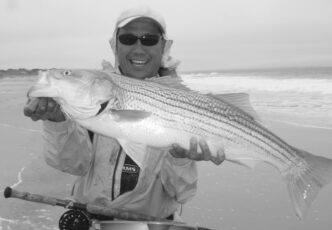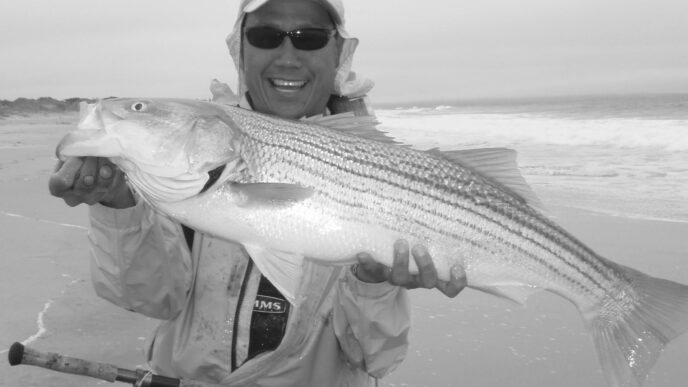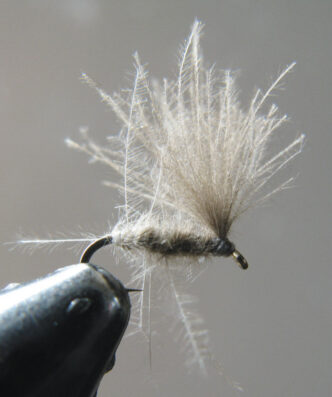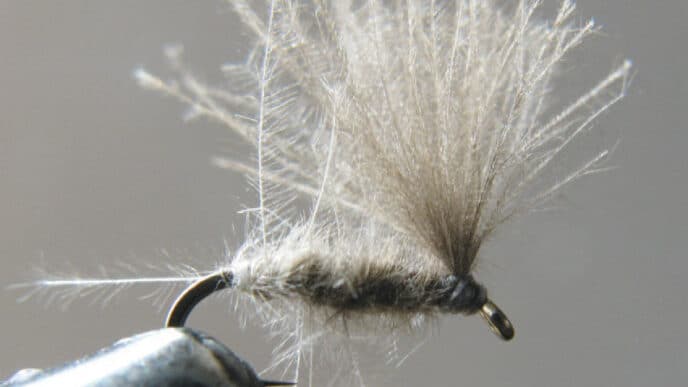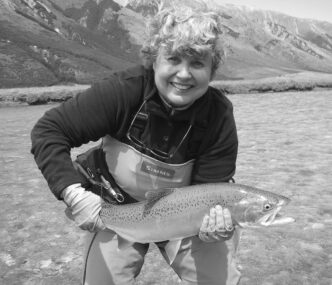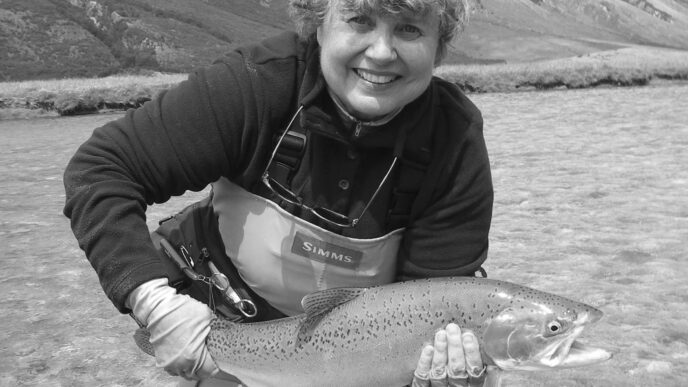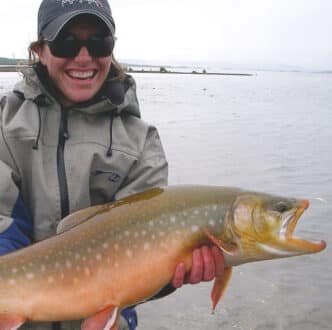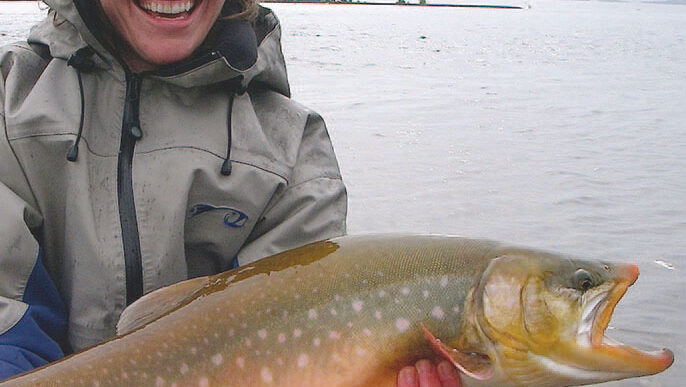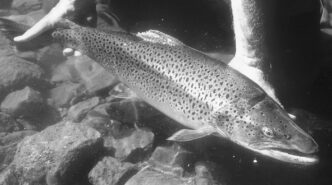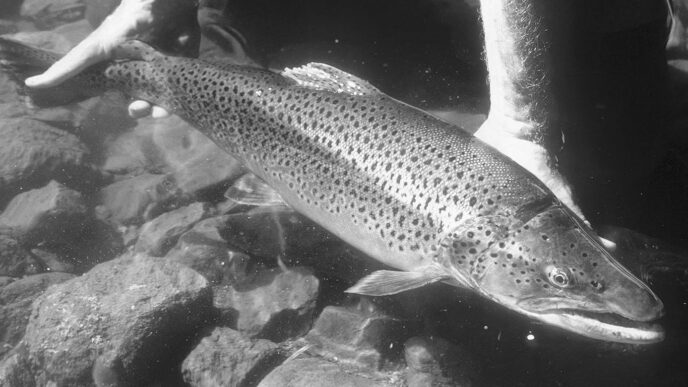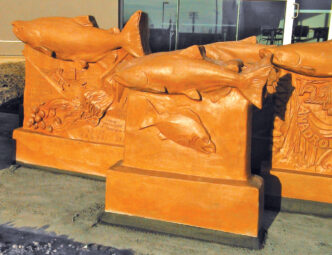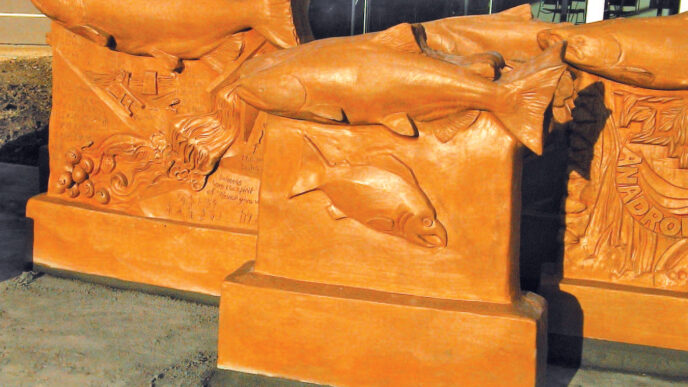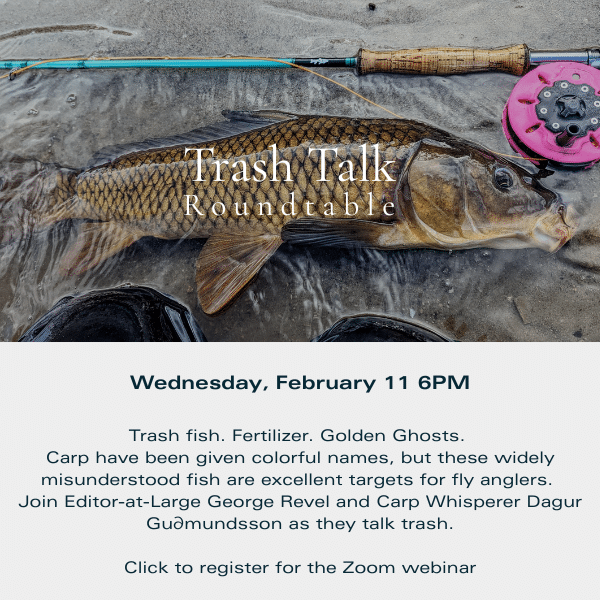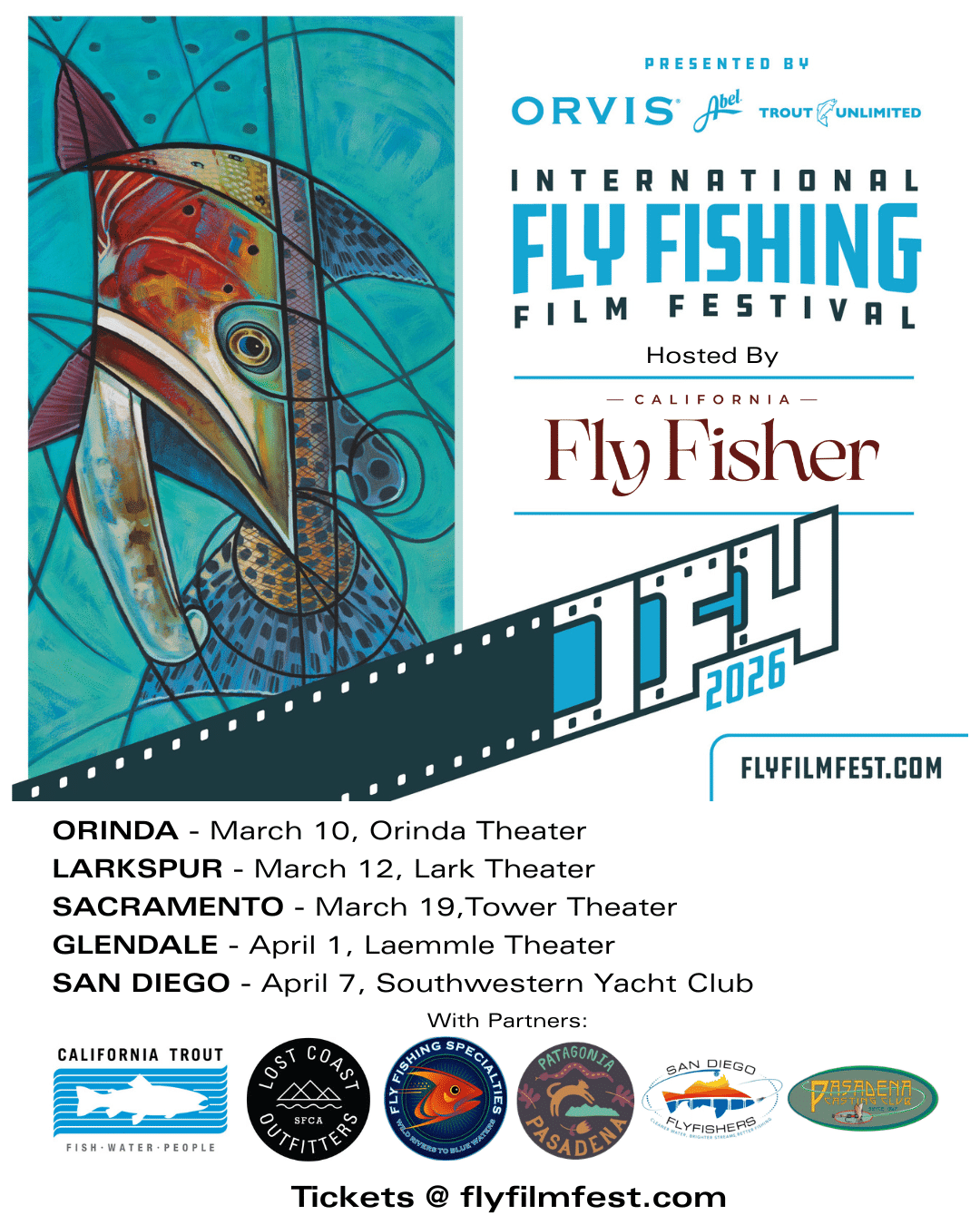(Author’s note: In what follows, the names have been changed to protect the innocent. Even “I” is an alias.)
So Manny’s getting remarried — “At last,” I think, when I hear the news, though I had no idea this was imminent, haven’t met his bride to be, and —
Suddenly I realize we’ve not fished together once this year. No matter; from the moment I get the e-mail invitation, it strikes me what a true romantic Manny’s always been, still devoted to Summer of Love politics and Fenwick fiberglass rods. The ceremony’s pleasantly twenty-first-century hippie: Nobody’s smoking anything at all. A half-score men sport ponytails shot with gray, most of us failing to compensate out back with what’s lacking ahead. Many of the women dress and look enough like they did in 1970 that you can imagine how a faintly free-love smile might have left you grinding enamel off your molars, and I mean that in the nicest way.
Of course, that was before our molars had crowns.
Dean and I catch Manny for a moment while wandering through what might be the reception line. He looks happy and slightly star-struck. “We’re taking you fishing for a wedding present,” says Dean, the first I’ve heard of this plan. “Fishing and Mexican food. Gluten-free, of course.”
“That would be great,” sighs Manny. “It’s been . . . I don’t how long it’s been, actually.”
Neither do I, though for a while there, the three of used to go five or six times a year, minimum.
“Since before he moved in with Melanie,” whispers Dean as we move away. “And that was thirteen months ago.”
Dean would know. He could probably cite you weeks and days. Like a lot of my friends, he’s at the obsessive end of the spectrum, pals who keep better time than atomic clocks.
I particularly appreciate this characteristic because my own mental calendar stacks people, stories, and stray conversations in undated piles, which is why I soon wonder if it’s been thirteen months or twice that since I saw Manny’s museum show downtown — several cases of his work, housed in an elegant collection of local artists presented in what looked like a first-class gallery. Finally I peg it to somewhere in 2006, shortly after a trip to the Grande Ronde when the brakes in Manny’s truck deserted us halfway down the canyon. ( Just for the record, “Damn, I thought I fixed those,” isn’t the reassurance one hopes for at such moments. Also FYI, that’s a slow road in first gear; when you’re setting the parking brake on every turn, jerking along sheer drops that will leave you philosophical or moist.)
Manny’s a jeweler by trade, not a mechanic, but it wasn’t gems and settings the museum folks admired. Or maybe it was: Technically, those were bass poppers, built of balsa and cork and assorted foams, beautifully feathered and haired, many with finishes that look “Simonized.” Manny put half a hundred on display, I suppose, out of five or ten or twenty times that many he’s crafted.
Had crafted, by then. I wonder how many he’s done by now. How many thousands of hours of work. . . .
Now on our own out on the lawn, Dean and I catch up. His folks have been keeping him busy — buried busy, sandwiching surgeries between moving to and from Arizona, buying and selling four homes and liquidating a collection of movie errata. Meanwhile, Dean’s sons have gone to and returned from three countries and four of five colleges and grad schools; his daughter’s horse died — she’s training a new “green” horse; also, his wife emerged intact from a frightening medical problem. “And did I tell you we were moving to Colorado? I mean, we’re not anymore, though we did a rush remodel on the house, and it’s still, officially for sale — but never mind that. What’s important,” he laughs, “is that I’ve almost replaced all of my steelhead and salmon tackle.’
“Replaced?”
“Well, yeah. When I thought we were moving to Colorado, I sold it all on eBay. But now I’ve bought almost all the new rods I’ll need, so I’m working on reels.”
At “reels,” I catch a furtive look in Dean’s eye, likely the quick wink of guilt. Of course. Nobody I know loves trading tackle like he does, especially rods, and I know few fishers who’ve held title to half so many, however briefly.
As to when he fishes them. . . .
I’m pretty sure it ’s been five years since Dean tried for steelhead. Given the conditions of our home rivers, it won’t happen again soon; never say “never.” Ah, but should the world change all of sudden — for the better, for once — as in Somebody hits a cosmic “rewind” that fastbacks fisheries 20 or 40 or 80 years. . . .
Dean will be ready. Soon. Just a few more reels.
I’m grinning about this as I drive home. It’s not a snide, uppity smile, certainly not superior. Truth is, we’re all hanging in and on as best we can, because fly fishing isn’t something we’ll get over this lifetime, recover from, grow out of. Tying, finding or making tackle we love, practicing casts on the water or in an eddy of mind, and, oh Lord, seeing and feeling the strike….
Hook’s in too deep. Barb like a whaling harpoon.
That’s what I’m smiling about; I’ll get back to that. Meanwhile….
Manny’s poppers are gorgeous and numerous, but in the best years I doubt he takes more than a dozen or two bass on top. Most that he catches are of modest dimensions, though he did get a three-pound-plus fish just before or after the museum exhibit.
The problem is mostly that Manny aims his ties at largemouths, and we just don’t have many nearby, and none with Florida ancestors. In truth, our best unsubstantiated hearsay fish are reported at six to eight pounds, unless you count a rumor of a ten-pounder taken from a part of the county where we’ve had two bona fide bestiality cases this year, one necessitating officials to euthanize “a cage of abused mice.” (Emphasis added, but I’m not making this up.) That is not to suggest that these still alleged crimes have anything to do with the reports of an allegedly double-digit black bass or even with the unproven allegations that it was stuffed from vent to gill with pencil weights, but I like to think this information provides a cultural context and a touch of local color.
Lest we digress: Manny’s a master bass-bug maker who’s still dreaming of an entire season equal to a good day on the Delta or Clear Lake or Lake Castaic. And that dream, all by itself, is good.
Speaking of which: Dean’s in a bit of the same boat with rods, for a different set of reasons. He understands them, butt to tip top — histories, actions, tapers, makers, and techniques. You can tell by the way he handles rods that this is love.
First, he raises a new one to his eyes and looks it over almost inch by inch. He slips his glasses off and on, peering intently and commenting as if appraising a promising art find, say a new Daumier. Believe me, it’s not cheap-shot criticism he’s offering or casual denigrations intended to ruffle refined sensibilities. To the contrary, Dean seems to want each one to succeed in some way — rather the way I feel about writers.
I can’t do him justice, but I’ll try: “Serviceable wraps, nothing fancy, but all intact. Cork’s been filled, but not badly, not too badly. See this binding below the second ferrule — that tiny change in color? Looks like somebody matched the original thread a while ago, but the new stuff’s not as faded as the rest. Might cover a nick or the beginning of delamination, but probably not a problem. Balance . . . can’t tell without a line out, but I’m guessing with an older, heavier reel and a 5-weight double taper, maybe one of those 444s Manny’s got in storage — throwing under the trees to those wilders on Stoney Creek? I can see that. Oh yeah, yeah I can.”
Love, all right. But there’s an irony here, almost: Dean fishes a shorter line than any angler I know, on moving waters or still. So if it’s all about distance — it so rarely is — you might compare him to the guy in the vintage Alfa Romeo putting down a straightaway.
This isn’t because Dean can’t cast. It’s partly because he reads water carefully, but mostly, Dean fishes close because he’s devoted to the Leisenring lift, a tactic fundamental to his style. He knows that the race to the surface of mayfly nymphs or caddis pupae makes them vulnerable, so he likes to get a sunk fly moving up, dashing toward the light at the sharpest angle he can manage.
This works for him. Dean really does strike most of his fish, often lots of fish, within a dozen feet of his hand, especially in lakes and estuaries. I’ll bet he sees half his hits through the bottom of his bifocals. I know he teases more takes from what most fishers treat as the waste end of a retrieve than some of us get stripping shooting heads we tried to cast through time zones. It’s a neat trick I’m still trying to learn. And while I bet rod action is critical — a quick set and instant tippet protection — I’m not at sure how or if “short-range shock strikes” factor into the frequently famous-maker rods he buys.
Perhaps they do, and maybe that plays a part in Dean’s relentless hunting. I doubt it, though. I think that however much Dean appreciates rods as artful tools, it’s their anticipated application that, way down, motivates his pursuit. The take, the touch, that moment: I think that’s what’s kept him dealing for decades at trade and collector’s shows and now on eBay and other sites that only accelerate his action even as responsibilities limit his days on the water. And if he buys or sells a rod for every outing he steals to fish one….
So?
Back to that grin. But let me make this clear:
If Manny’s or Dean’s passions, seen in these contexts, make either look even faintly foolish, let me fix that quick: That ain’t it. Not only is my smile respectful, it’s appreciative and fond — and not just because I’ve more dubious foibles by far. In fact, I mention them here, with a preamble from Manny’s wedding, to set a larger stage.
Home from the nuptials, I spent another evening with my brother, visiting from London. We had eight days to wander memories shared, unique, and occasionally conflicting. I don’t know where he gets some of these things.
The evening after the wedding I put him into a nice smallmouth he brings close enough to gander. This takes us back to a bass he hooked on a MirrOlure, circa 1962, I guess, but while driving home, he abandons the past for the future.
“Do you have any idea,” he asks, apropos of nothing on the windshield, “where you want to be in ten years?”
Ah. Well, sure. I mean everybody, ahh. . . .
Let me not rush to answer this, although you may if you must. And I have done this exercise at least once before, developing a “five-year plan” about the time the Soviet Union apparently abandoned publicizing that habit. I remember only one element now: to write a fly-fishing column.
So thanks to modest ambition — and a feeble memory, I suspect — I’m batting a hundred percent, which is all the more reason to take care what I wish for — to consider consequences, you know, especially since it sounds like Little Bro’ might have his own schedule nailed down.
Let’s begin with time of life:
Like Manny, Dean, and me, my brother’s “middle-aged.” We’ll all pass sixty within five or six years. We’re all married (now), with kids, though Manny’s are grown, and with his mother’s recent death, he’s the only one not caring for an aged parent or two.
None of us have made noises about retirement, so far, not counting occasional woeful sighs. We’ve all taken the more or less standard brutal beatings from an economy that isn’t getting better fast. The three Americans pay health-insurance premiums equal to or higher than our mortgages, and Dean and I also contemplate kids’ college costs roughly surpassing Seward’s Folly. (My English brother does not face either of the latter burdens, but lives under an iron heel of socialism so numbingly heavy he claims hardly to notice its weight — a classic symptom of the downtrodden.) Our jobs fail to keep us fit and vigorous, ditto our leisure pursuits, though Dean still works out every so often, inevitably paying for that pleasure with a month or two of Aleve regimens — and, at least once that I know of, a painful round of physical therapy. We march onward with assorted limps, annoyed by conditions and syndromes that will, let’s face it, cripple us over time. (I’m only guessing about gluten intolerance, but this tendonitis in my casting elbow could leave me one-winged by the end of the week.)
In other words, we’re more or less average for our ages.
Except for this. When it comes to one element ten years away, three of us can supply the same answer with conviction. I’ll include it here in my own top trio:
- Happily watching kids grow up, and grandkids
- Writing something
- Fly fishing, one way or another
Manny and Dean would list 1) and 3), at least. Count on that.
Bro’s answer, distilled:
He’ll be working, 2); and 1) is certain. As for 3). . . .
Ain’t there yet, and no real substitutes loom. He has thoughts and a “maybe,” but busy as he’s been, is, and will be until then . . .he doesn’t see any great pleasure on his horizon.
Ever the Helpful Older Sib, I naturally advise the obvious.
“You should learn to fly fish,” I say firmly.
“I don’t think so,” he says.
“Yes, you should. Seriously. There’s so much to it.”
“No. No, I don’t have your predator thing, that hunting thrill I see in your face whenever you see fish. Like when you spotted that bass tonight, for instance.”
“That’s just a part of it. Tying’s an art form, casting is its own sport, and you won’t get hurt.” (An accidental untruth: The tendonitis starts a week later.) “Also —”
“I don’t want to,” he insists, in tone that sounds vaguely familiar.
But would an older and so wiser brother let it go at that?
He would, as a matter of fact, exercising a restraint that surprises us both into several moments of startled silence. “But I wouldn’t mind finding something like it,” he says at last. “Something, I could, well . . .”
“Engage,” I interrupt.
He’ll figure something out, I bet. But for me — for Manny and Dean — for you, or you’d not read this magazine, or meander so far as this sentence….
Fly fishing. As a whole. In its parts — so many dimensions to capture our attention, to convince us, perhaps too often, how much more we have to learn and reward us so handsomely when we do. Carving poppers, trading rods, practicing casts, writing about fishing moments — and for so many, thank God, soldiering in the wars that affect all water. (I think younger fly fishers, by which I mean my generation and all you cherubs coming after, owe most of today’s fishing to our senior partners, many of whom beat back ever harder against the agents of fisheries destruction — a war Dean and Manny have fought for decades.) Absent something like this, that, those? Something to engage?
It’s not a rhetorical question. It really isn’t, so I’m still ruminating about this a week after my brother has returned to his side of the Atlantic when I remember an exchange with my friend Steve, a private investigator then handling some of the world’s more prominent cases.
He was describing a defendant in a big federal trial of a foreign national alleged be one of the world’s larger dealers of illegal smokable vegetation.
As in tons. Hundreds of tons. As in millions — tens or hundreds of millions of dollars. As in half a dozen wives, a score of kept concubines, and a collection of “legitimate” money-laundering corporations owning several luxury hotels, construction companies — A man with the income of Iowa,I found myself thinking. In five lifetimes of lunatic profligacy, he couldn’t spend all his money — and not in a thousand years spent in a cell with limited Wi-Fi, surrounded by people of unfortunate dispositions where the “ten-year plans” offer certificates in “laundry” and canned-food preparation.
“So why?” I asked Steve. “Why didn’t he stop?”
He shrugged. “Who knows. Lot of these guys, it’s the only game they play, their only thrill.”
Beat. Beat. Think.
“So what you’re really saying is . . . this guy still deals drugs by the shipload —”
“Allegedly.”
“Allegedly, so will now go to prison —” “Probably.”
“— until he’s an old man or corpse, because he can’t think of anything better to do? Because —” it leaps out of me like Helios launching from horizon to high noon “— because he never learned to fly fish?”
Steve laughed. “I suppose that’s one way of looking at it.”
By which he means there might be others. But I know you get the idea. I don’t suppose it’s a theory you can ride rampant or apply to a Jeffrey Dahmer, insisting “If he’d only stuck to dry flies, on fishing trips where the food was Mexican, gluten-free ”
On the other hand, if we propose fly fishing as a metaphor — no, just as an example, like golf, God help us, or gardening, biking, travel, sculpting or playing classical piano….
Or rebuilding Alfa Romeos, I write with purpose.
Six weeks ago, an uncle-in-law — a man who looks all of 60 and that day turned 81 — reminded me of something I said to him when we met twenty-something years ago, the summer I learned to fish a bass pond hidden outside Santa Rosa.
“You remember this?” he said, tipping toward me a glass of birthday champagne. “You and Lisa came to see us. So I’m out in the garage, and here comes my niece’s new boyfriend. You walk over, and I look up
from under the hood of that old Alfa to see this, well, this shaggy kid grinning at me. So you said — you remember what you said?”
I laughed because I almost did. “About a ‘passion.’”
“You’re damn right! You are damn right. You said, ‘Man, I love to see somebody with a passion.’ ” He laughed. “First thing you ever said to me. Then something about it being ‘The greatest gift, to have a passion in life.’”
“Had I been drinking?”
“I don’t think so!” he said emphatically. “But I know that got us started pretty quick.”
Then, because I asked, he began to tell me about his newest project — another Alfa, dug out of another garage after decades in storage.
“So you know the first person I’d take for a drive, if I could?”
I could guess. The day before, I’d watched him talking to my twelve-year-old son for almost an hour.
“Max,” I said.
“That’s right. That’s exactly right. I can’t believe what your son knows already. You talk about a passion? His won’t quit — you know that, don’t you? That he’ll never lose it?”
We raised glasses.
We may release the fish we catch, but they don’t always return the favor.
And it’s a tight line that binds us to those memories — and to hopes, however distant the connection appears to the rest of the world. The moment created by expectation tensions every wrap of thread on a shank, each flex of a rod; it justifies all our messing about in waders and boats. Pick a new boot or refelt an old sole, stare hard at waters when crossing a bridge, worry that an elbow injured hammering nails might hurt your double haul. . .
All pieces of a hundred that will — somewhere, sometime — converge.
That’s what I’m smiling about. Because I know that’s how it feels to be Manny and Dean and a whole lot of people I haven’t quite met, with whom I might trade sly smiles at the sins and satisfactions we share.





